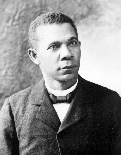


As a slave, Booker did not have a last name and chose "Washington," his stepfather's first name. Washington worked at a salt furnace at the Salines at the age of nine and later in a coal mine along Campbell's Creek. He attended public schools for a brief time under noted Kanawha Valley African-American teacher William H. Davis. Washington was also a servant for Viola Ruffner, who taught him how to read.
In 1872, Washington began attending the Hampton Normal and Agricultural Institute in Virginia. After graduating in 1875, he returned to Malden to teach school for both black children and adults. During this time, Washington became recognized as an eloquent speaker and a leader in the black community. In 1877, a referendum was held to determine the permanent site of the West Virginia state capital, which had been alternating between Charleston and Wheeling since the state's creation. Local political leaders John Kenna and Romeo Freer convinced Washington to travel around the state and influence African Americans to vote in favor of Charleston. There is no record of the actual black vote in the referendum, but Charleston was chosen overwhelmingly over Clarksburg and Martinsburg.
In 1878, Washington left the state and only returned occasionally to visit family. After studying at the Wayland Seminary in Washington, D.C., he taught at Hampton Institute. In 1881, he was chosen to direct a new normal school for blacks in Tuskegee, Alabama. Under Washington's leadership, the Tuskegee Normal and Industrial Institute became one of the leading African-American educational institutions in the country. The school promoted the pursuit of specific vocational skills and development of proper manners and good morals.
At a time when many black leaders rejected the laws and traditions which discriminated against African Americans, Washington spoke in favor of cooperation. In one of his most famous speeches in Atlanta, Georgia, in 1893, he said, "In all things that are purely social we can be separate as the fingers, yet one as the hand in all things essential to mutual progress." W. E. B. Du Bois labeled the speech the "Atlanta Compromise" and denounced Washington's emphasis of vocational over intelluctual development. Washington's visit to the White House in 1901 further angered radical civil rights leaders. To counter Washington's philosophy, Du Bois, Martinsburg newspaper editor J. R. Clifford, and others formed the Niagara Movement, the second meeting of which was held in Harpers Ferry in 1906. This crusade led to the organization of the National Association for the Advancement of Colored People (NAACP). As racial tensions increased during the early 1900s, white Americans as well as many African Americans rejected the radical stance of the NAACP and accepted Washington's philosophy of compromise.
Washington presided over Tuskegee Institute until his death on November 14, 1915. He wrote twelve books, the most famous of which, Up From Slavery (1906), recounted his early life in Malden. Washington remains one of the most respected yet controversial subjects of African-American history. Tuskegee Institute provided educational opportunities for many blacks which would not have existed without his leadership. However, while many African Americans demanded change, Washington advocated acceptance of the status quo.